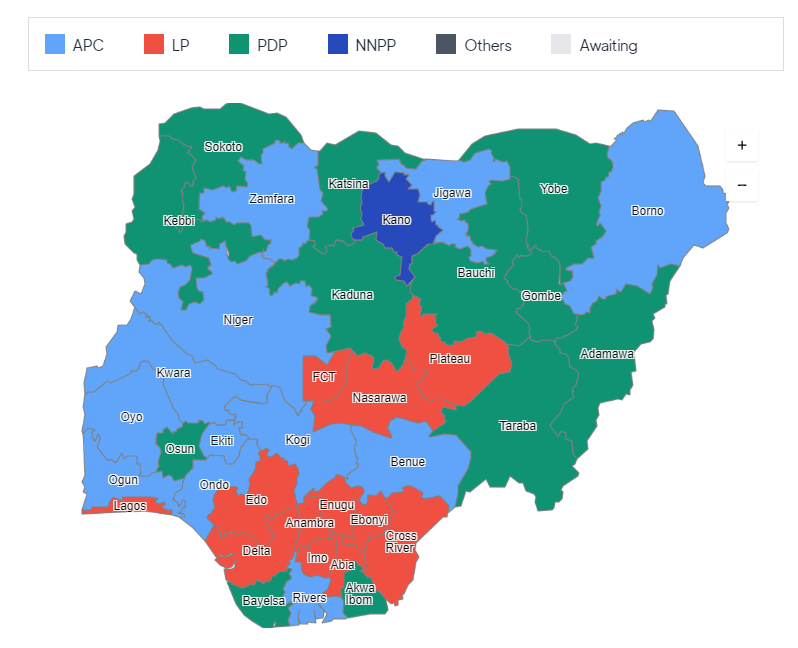Boolean Logic, missing brackets and the 2023 Nigeria Presidential Election Tribunal

The 2023 Nigeria Election was an incredible event where a minor candidate with a tiny party rode on social media support to getting almost the same number of votes as the ruling party and the former ruling party.
The election just ended, and the vote is very close between all parties:
- Peter Obi Labour Party: 6.1 million votes
- Atiku Abubakar PDP Party: 6.9 million votes
- Bola Tinubu APC Party: 8.7million votes
The Labour Party and Peter Obi filed a case at the election tribunal challenging the outcome of the election, and there is a very interesting provision that rests on how you interprete the boolean logic of the constitution.
Here is the problem: Nigeria has 36 states and one Federal Capital Territory (FCT). The FCT is not a state like the others - it’s managed by the federal government and acts as the capital. It does not have a Governor, it has a minister that is appointed by the federal government.
There is a clause in the constitution:
137 (2) (b) A candidate for an election to the office of President shall be deemed to have been duly elected where, there being more than two candidates for the election he has not less than one-quarter of the votes cast at the election each of at least two-thirds of all the States in the Federation and the Federal Capital Territory, Abuja.
What exactly does the “and” mean here? There are two ways of interpreting this
- The candidate has 25% of the vote in 2/3rd of the states, of which the FCT is to be treated as a state.
- The candidate has 25% of the vote in 2/3rd of the states, and separately, needs to achieve 25% of the vote in the FCT as well
There has never been a situation before now where a candidate won the popular vote, but did not achieve 25% in the FCT. In the current election, only Peter Obi achieved the 25% threshold in the capital city, while the other two candidates, who INEC said had more votes, did not achieve this threshold. So the intepretation of this phrase becomes very important, as it changes who wins the election.
Some argue that the drafters of the constitution wanted the FCT to be a special territory, and as the center of unity of the country, presidents should show that at least 25% of the residents there want them. Others argue that if this is allowed to hold, then any presidential candidate popular enough in the FCT can always prevent other candidates from winning by simply sweeping all the votes in the FCT. They say that what is meant is that the FCT should be treated the same as any other state for this purpose.
Let’s try to describe this programmatically:
Scenario one (FCT is not special)
total_states = 37
states_25_percent_achieved = x
ratio_achieved = states_25_percent_achieved / total_states
if ratio_achieved > (2/3):
eligible_to_win = true
else:
eligible_to_win = false
Scenario two (FCT is special)
total_states = 36
won_25_percent_in_fct = y
states_25_percent_achieved = x
ratio_achieved = states_25_percent_achieved / total_states
if ratio_achieved > (2/3) and won_25_percent_in_fct:
eligible_to_win = true
else:
eligible_to_win = false
But now this introduces a wrinkle. 2/3rd of 37 states is 24.66 states. 2/3rd of 36 states is exactly 24. If the first scenario is correct, then what exactly does 24.66 states mean? Does it mean the person must achieve the threshold in 24 states or does it mean 25 states? Some argue that since the 24.66 was not explicitly clarified, it must imply that the second scenario is the correct one.
Also what exactly does “and” mean in the constitutional section:
“of at least two-thirds of all the States in the Federation and the Federal Capital Territory, Abuja”
In programming, if you say x and y, then you mean that both x and y must be true. But where the brackets are placed matter.
“of at least two-thirds of (all the States in the Federation and the Federal Capital Territory, Abuja)”
is different from
“of at least (two-thirds of all the States in the Federation) and (the Federal Capital Territory, Abuja)”
Unfortunately, the drafters of the constitution failed to add the brackets, and now the supreme court will need to decide where exactly those brackets belong.
Here is an article explaining the different ways they could interprete it: https://www.lawteacher.net/free-law-essays/administrative-law/critical-analysis-of-the-literal-golden-and-mischief-rule-law-essay.php
